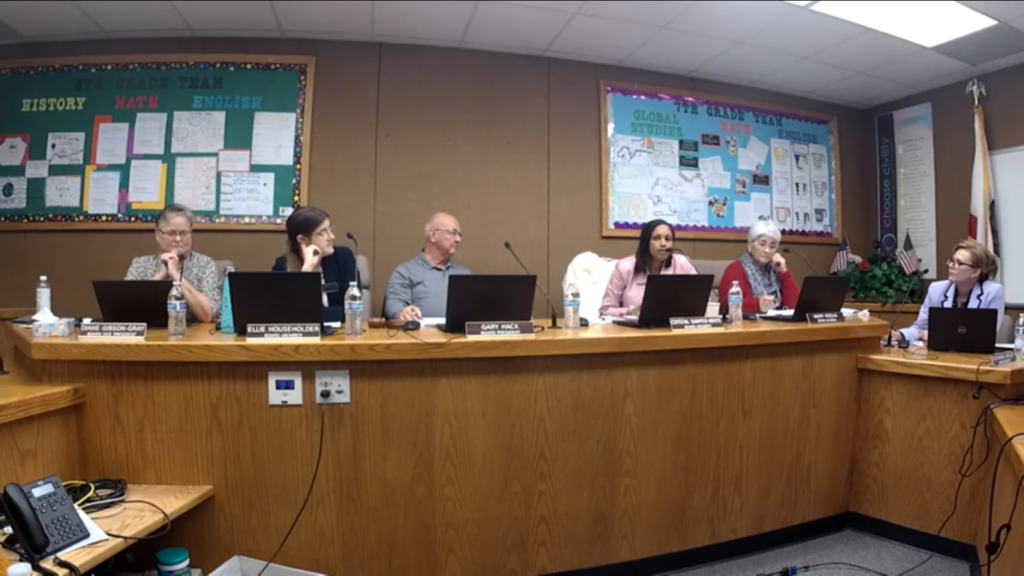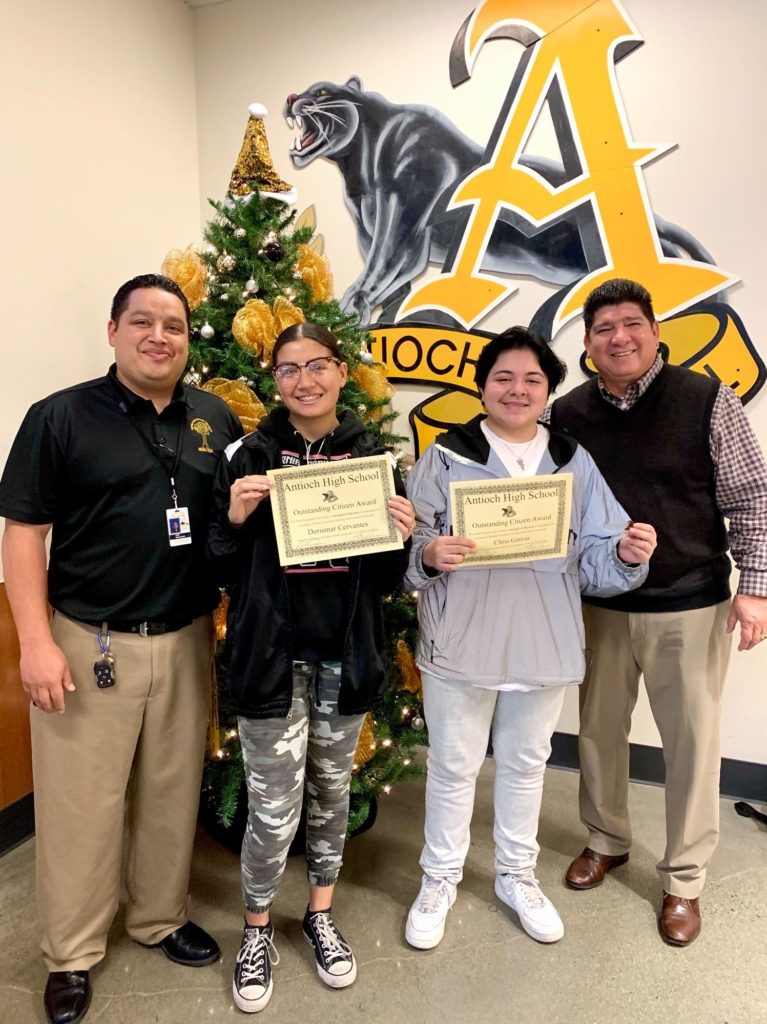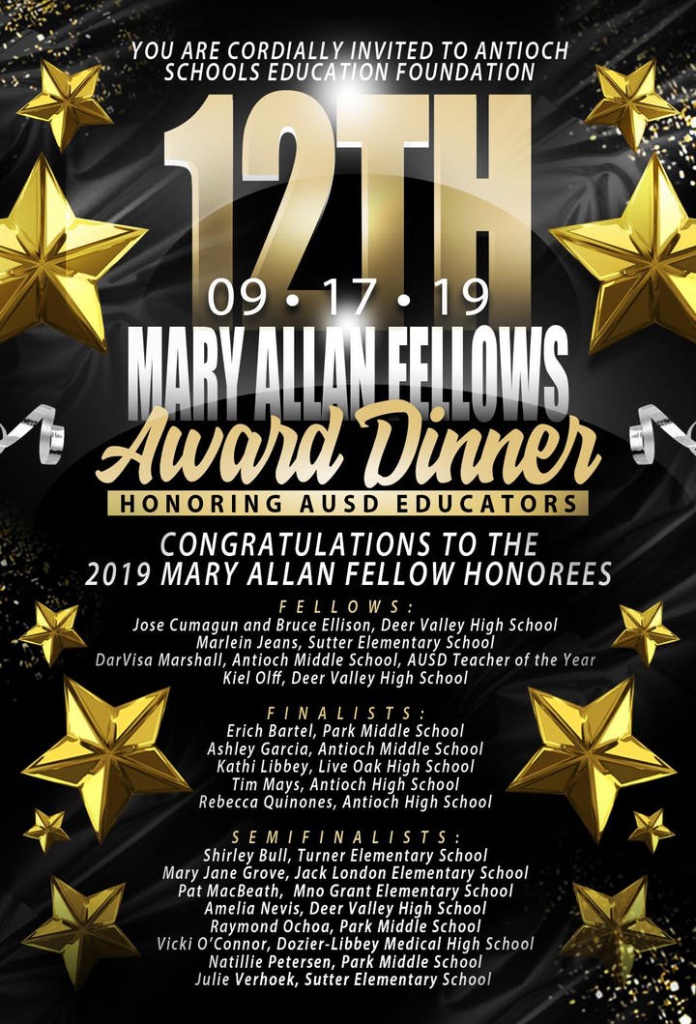Antioch School Board again bypasses trustee Sawyer-White for president, Householder loses VP election after abstaining on vote
Saturday, December 14th, 2019
Trustee Crystal Sawyer-White speaks during the discussion on the election of president and vice president at the Antioch School Board meeting on Wed., December 11, 2019. Screenshot of YouTube video.
Third time a female African American trustee was passed over for the position. Racism raised by Householder.
Gibson-Gray elected president on 3-2 vote.
Rocha elected vice president also on 3-2 vote after Sawyer-White declines the position, again and Householder’s nomination fails on 2-2 vote after she chooses to not vote for herself.
By Allen Payton
For a second year in a row the Antioch School Board majority chose to bypass fellow trustee, Crystal Sawyer-White in their election for board president at their meeting on Wed., Dec. 11. Instead, Diane Gibson-Gray was elected president on a split vote with Sawyer-White and Trustee Ellie Householder voting against. Trustee Mary Rocha was elected board vice president, also on the same split vote. (Watch the meeting on YouTube, beginning at the 1:41:00 mark)
Last year Gibson-Gray’s reasoning for not electing then board vice president Sawyer-White to be president was that she didn’t have the necessary experience or knowledge to handle the job. Instead trustee Gary Hack was elected board president, with the support of both Gibson-Gray and trustee Mary Rocha. (See related article) Sawyer-White was offered the position of vice president, again. But she declined. Instead Gibson-Gray was elected board vice president.
This year, the reason given by Gibson-Gray for bypassing Sawyer-White for president was because she hadn’t served as board vice president, even though she had.
This was the third time a female African American member of the Antioch School Board was passed over for the presidency. In 2017, former trustee and then-board vice president Debra Vinson was not elected president in her final year on the school board. (See related article) Instead of running for reelection in 2018, she ran for county school board but was unsuccessful.
The positions of president and vice president are usually rotated among the trustees each year, with each member being given the opportunity to serve first as vice president, then as president during their four-year term. The same occurs on 14 of the 19 city councils in the county with the positions of vice mayor and mayor. However, sometimes power play politics and personal agendas get in the way and school board trustees or council members get passed over.
Gibson-Gray Elected President, Offers Sawyer-White Vice Presidency, Mentoring
Following approval of the consent calendar on the meeting’s agenda and without comment, Rocha nominated Gibson-Gray to be board “chair”. Board President Hack seconded the motion.
Trustee Householder was first to comment.
“I just think that at this point I would prefer that trustee Sawyer-White become the board president, just based on the fact that she hasn’t gotten to be the board president at all, and in the last year she has gone to a ton of different trainings and I’ve seen a huge growth in her knowledge of what’s current in the district, in terms of what’s going on in the state and what’s going on in the county,” she said. “Out of fairness it’s time to give someone else a shot at being in the leadership on this board.”
Householder attempted to make another motion to nominate Sawyer-White, but the current one hadn’t been voted on yet.
“I just thought there would be some consideration. But, I’m not surprised,” Sawyer-White said. “I would at least like Ellie, to nominate her for V.P…. to give someone else the opportunity.”
Gibson-Gray responded.
“Well, last year, in our meeting, I wanted you to be vice president, Crystal, before you left the meeting, because I wanted you to spend a year growing,” she stated. “And I agree with Ellie, you have grown. But there’s a difference. It’s difficult to run the meetings if you haven’t been the vice president. You see that I help Gary all the time. I would like you to be vice president, this year and I would like to mentor you for the presidency, if you’re willing. That’s what I wanted to do, last year.”
“Again, you know, other districts it’s a rotated basis. I’ve been vice president,” responded Sawyer-White. “I hear what you’re saying, Trustee Gibson-Gray. But we’re in the 21st century and I’ve put a lot into this position. It just would be a new direction. People are watching this on YouTube. I’m not surprised. Last year was a little different and I just have a little more chutzpa. That is my suggestion. Ellie, I think she should be vice president.”
“I get the idea that you be the vice president, then you get to be the president,” Householder said. “But…she’s been the V.P. at one point. She’s also completed the governance training and she’s also very, very active in advocating for AUSD at the state level, at the county level. She’s constantly trying to learn. She’s constantly bringing in that new, fresh perspective. I think that she’s extremely qualified to be the president. To say it’s gotta to be next year, well, who’s to say she’s going to run again? Then, she’s not even to have the opportunity because she’s going to term out, next year. I don’t see why we don’t give everyone a fair shot in this district”
“The fact we have a high African American student population, here. I think it would be amazing to have a strong Black woman in this position of leadership for our district,” Householder continued. “We all help each other out so why not just give someone else a chance to be in this position?”
“I’m going to go back to last year,” Gibson-Gray responded. “I wanted Crystal to be the vice president. But she was upset, and she walked out of the meeting. If she had stayed that’s what it would have been. She would have stayed in the vice presidency for one more year and then she would have been moving up. I’m the vice president and you say ‘you should move up.’ I would like Crystal to be vice president. That’s all I’m saying. End of discussion for me.”
Then things got a bit heated.
Householder Injects Racism Into Discussion
“To have one bad day and we’re judging somebody based on one bad day,” Householder responded. “I mean, could you imagine feeling like you’re being attacked for the way that you were born and the amount of melanin in your skin? I can understand why somebody would…”
“I take offense at that,” Gibson-Gray shot back, cutting her off.
“I object to that, Mr. Chair. I object to that statement,” Rocha stated.
“No, I’m saying that’s how she felt and that’s why she left,” Householder responded.
“OK. We have a motion on the table,” Gibson-Gray stated.
“Call for the motion,” said Rocha.
Hack asked for the vote on the “motion for Diane Gibson-Gray to be president for the incoming year” and it passed 3-2 with Householder and Sawyer-White voting no.
Sawyer-White Nominated for Vice President Again, Declines Again
“With that I’d like to nominate Crystal Sawyer-White for the office of vice president,” Gibson-Gray said. Rocha seconded the motion.
“How do you feel about it, Crystal?” Householder asked.
“I think you should have the opportunity,” Sawyer-White said. She then attempted to nominate Household to be vice president, but the other motion hadn’t yet been voted on.
“Again, this is not about leadership. This is about the students,” Sawyer-White said. “I just think once they look at, you know leadership has changed. This really empowers the students. I’m wishing for our graduates, students of color to come back and teach in the district. I have many visions and it’s not about me. So, yes, I’m nominating Ellie Householder.”
“Are you willing to be vice president?” Gibson-Gray asked.
“No, I decline,” Sawyer-White responded.
“The motion dies because she’s not going to do it,” Gibson-Gray said.
Householder Nominated V.P. But Chooses To Not Vote For Herself
Sawyer-White then nominated Householder to be vice president and Hack seconded the motion. Hack and Sawyer-White voted in favor but Householder wouldn’t vote for herself.
“I just figured I would abstain since it had to do with me,” she said. “I’m uncomfortable.”
“It’s OK to vote for yourself,” Superintendent Stephanie Anello shared.
“It makes me uncomfortable,” Householder replied.
With Gibson-Grey and Rocha voting no, the motion failed on a 2-2-1 vote.
Rocha Elected Vice President
“With that I’d like to make a motion for Mary Rocha to be vice president,” Gibson-Grey said. “She has 40 years of experience which includes running meetings of the school board, Roberts Rules of Order, the Brown Act, etc.”
“I give myself a second, I can do that,” Rocha said.
The motion passed on a 3-2 vote with Sawyer-White and Householder again, voting no.












 Will benefit schools and affect properties in former Mello-Roos District
Will benefit schools and affect properties in former Mello-Roos District SALT LAKE CITY (Grassroots Newswire) November 5, 2019 – The following local residents have earned their degree from Western Governors University (WGU). The online, nonprofit university held its 71st (Cincinnati, Ohio); 72nd (Anaheim, California); 73rd (Salt Lake City, UT); and 74th (Seattle, Washington) commencement ceremonies in the spring and summer of this year to celebrate the recent graduation of more than 10,000 students from across the country.
SALT LAKE CITY (Grassroots Newswire) November 5, 2019 – The following local residents have earned their degree from Western Governors University (WGU). The online, nonprofit university held its 71st (Cincinnati, Ohio); 72nd (Anaheim, California); 73rd (Salt Lake City, UT); and 74th (Seattle, Washington) commencement ceremonies in the spring and summer of this year to celebrate the recent graduation of more than 10,000 students from across the country.
















